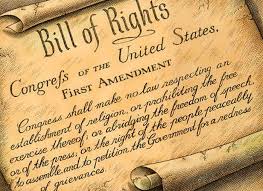[This is part two of a series of reflections from the recent Southern Baptist Convention, held in Phoenix, Arizona on June 11-14] Last week, I shared with you how our denomination bumbled somewhat with a resolution condemning the “alt-right” movement. Despite the fact that we did not handle the situation as well as we could have at the start, I do believe we ended well. Resolution #10 was clear and unequivocal regarding where we stand as a denomination regarding any Satanic notion of ethnic supremacy. I am thankful we are part of a denomination where the local churches that comprise it have the ability to make course corrections such as this when necessary. However, we should not lose sight of the fact that we can be part of such a denomination because of the religious liberty we enjoy in our nation.
 We Baptists have a very long history of supporting religious liberty for all, going all the way back to our roots in the 1600s. Unfortunately, many of us are unfamiliar with our Baptist history. We have traditionally been known as “the people of the Book” because of our utter reliance on Scripture as the ultimate authority in all matters of faith, practice, and life (that is, we have always held to the Reformation principle of sola Scriptura). This is perhaps nowhere better illustrated than in the practice by which we take our name: baptism. Most of the Reformers, such as Luther and Calvin, viewed baptism as a sign of the New Covenant (like circumcision was the sign of the Old Covenant) to be administered to infants. While they had broken with the Roman Catholic Church and its teaching that baptism washes away the stain of original sin, they did not come to what we believe to be a Biblical understanding of baptism. As Baptists, we believe that baptism is a sign of our identity with Christ in His death and resurrection, something that can only happen after a profession of faith. It is a declaration to the world of both our identity with Christ and our obedience to Him. One of the results of this theological belief was persecution from what were often state-established churches (e.g., the Church of England).
We Baptists have a very long history of supporting religious liberty for all, going all the way back to our roots in the 1600s. Unfortunately, many of us are unfamiliar with our Baptist history. We have traditionally been known as “the people of the Book” because of our utter reliance on Scripture as the ultimate authority in all matters of faith, practice, and life (that is, we have always held to the Reformation principle of sola Scriptura). This is perhaps nowhere better illustrated than in the practice by which we take our name: baptism. Most of the Reformers, such as Luther and Calvin, viewed baptism as a sign of the New Covenant (like circumcision was the sign of the Old Covenant) to be administered to infants. While they had broken with the Roman Catholic Church and its teaching that baptism washes away the stain of original sin, they did not come to what we believe to be a Biblical understanding of baptism. As Baptists, we believe that baptism is a sign of our identity with Christ in His death and resurrection, something that can only happen after a profession of faith. It is a declaration to the world of both our identity with Christ and our obedience to Him. One of the results of this theological belief was persecution from what were often state-established churches (e.g., the Church of England).
Over the years, our Baptist forbearers put forth strong arguments for religious liberty for all, so that each person might worship God according to the dictates of his or her own conscience. After all, they were denied what we take for granted to be basic human liberty. Roger Williams was banished from the Massachusetts colony for being a Baptist, establishing the colony of Rhode Island. Henry Dunster, the first president of Harvard College, was dismissed because he came to see the Scriptural model of believer’s baptism. Baptists in Connecticut had their lands confiscated and goods sold in order to support another denomination. Is it any wonder, then, that the Danbury Baptist Association in Danbury, Connecticut wrote to Thomas Jefferson in 1801, “Our sentiments are uniformly on the side of religious liberty: that Religion is at all times and places a matter between God and individuals, that no man ought to suffer in name, person, or effects on account of his religious opinions, that the legitimate power of civil government extends no further than to punish the man who works ill to his neighbor”?
When the Ethics and Religious Liberties Commission and the International Mission Board filed amicus curiae briefs arguing for religious liberty to be supported by the Supreme Court in a case surrounding the building of a mosque in New Jersey, they were standing firm in a long line of Baptists who have supported this fundamental principle. They were not supporting Islam; they were standing against a government that would put capricious requirements on a religious group that wanted to build that they would not put on groups that the government favored. It is not hard to see that if this precedent were allowed to exist, evangelical Christians would be forbidden from establishing churches in places such as San Francisco, for example, under the veil of “zoning regulations.” Indeed, just such a situation already exists in Chicago. Religious liberty that only applies to us and people like us is not liberty at all, but rather is nothing less than the state-sponsored and state-protected religion we Baptists have stood against all of our existence. Just something to think about…

0 Comments